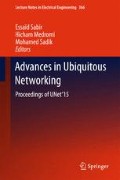Abstract
Variable-speed wind energy conversion systems (WECSs) have become increasingly important in recent years as they enable obtainment of maximal output power in the fields of the low and average wind speeds. In this study, we focus on WECS using doubly-fed induction generators (DFIGs) and present models for the turbine and doubly-fed induction generator. The main objective is to study two types of nonlinear controls; sliding mode and backstepping used for control of the grid-side converter will be also studied and analyzed. Matlab / Simulink simulation results are included.
Preview
Unable to display preview. Download preview PDF.
References
Lazhar, R.: Modélisation et Commande de la Génératrice à Induction Double Alimentée Couplée sur un Réseau Electrique (2012)
Gaillard, A.: Docteur de l’Université Henri Poincaré, Nancy-I
Poitiers, F.: Etude et commande de generatrices asynchrones pour l’utilisation de l’energie eolienne-Machine asynchrone à cage autonome-Machine asynchrone à double alimentation reliée au réseau, Université de Nantes (2003)
Multon, B., Roboam, X., et al.: Aérogénérateurs électriques (2006)
Ghennam, T., Berkouk, E.M., François, B., et al.: Modeling and Control of a Doubly Fed Induction Generator (DFIG) Based Wind Conversion System (2009)
Cherif, B.: Simulation de la commande vectorielle par régulateurs à mode glissant d’une chaîne éolienne à base d’une machine asynchrone à double alimentation (2014)
Errami, Y., Ouassaid, M., Maaroufi, M., et al.: A performance comparison of a nonlinear and a linear control for grid connected PMSG wind energy conversion system. Int. J. Electr. Power Energy Syst. 68, 180–194 (2015)
Guessas, M.L.: Backstepping Backstepping adaptatif pour le contrôle la poursuite et la synchronisation des systèmes dynamiques non linéaires chaotiques, Université de Biskra (2012)
Khedher, A., Khemiri, N., Mimouni, M.F., et al.: Wind Energy Conversion System Using DFIG Controlled by Backstepping and Sliding Mode Strategies. Int. J. Renew. Energy Res. IJRER 2(3), 421–430 (2012)
El Mahdi, A.S.A.: Commande en vitesse par mode glissant d’une Machine Asynchrone à Double Alimentation
Benaskeur, A.R.: Aspects de l’application du backstepping adaptatif à la commande décentralisée des systèmes non linéaires (2000)
Author information
Authors and Affiliations
Corresponding author
Editor information
Editors and Affiliations
Rights and permissions
Copyright information
© 2016 Springer Science+Business Media Singapore
About this paper
Cite this paper
Berdai, A., Reddak, M., Belfqih, A., Jamal, B., El Mariami, F., Hmidat, A. (2016). Analytical Study of Nonlinear Controls Applied to Wind Energy Conversion Systems Using a DFIG. In: Sabir, E., Medromi, H., Sadik, M. (eds) Advances in Ubiquitous Networking. UNet 2015. Lecture Notes in Electrical Engineering, vol 366. Springer, Singapore. https://doi.org/10.1007/978-981-287-990-5_37
Download citation
DOI: https://doi.org/10.1007/978-981-287-990-5_37
Published:
Publisher Name: Springer, Singapore
Print ISBN: 978-981-287-989-9
Online ISBN: 978-981-287-990-5
eBook Packages: EngineeringEngineering (R0)

